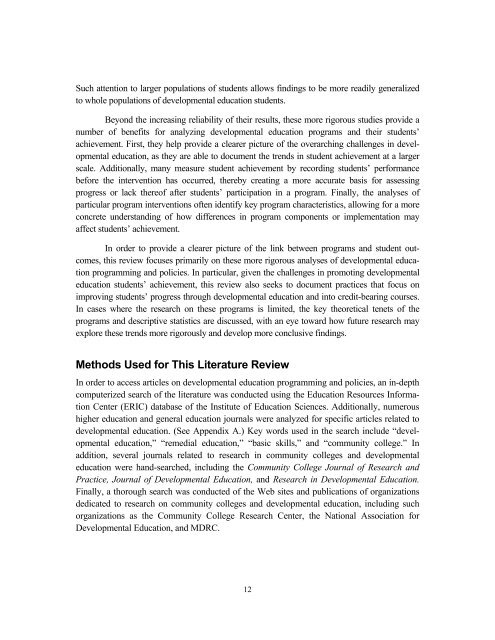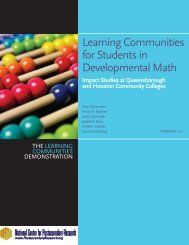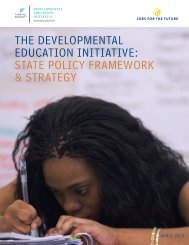Full PDF - MDRC
Full PDF - MDRC
Full PDF - MDRC
Create successful ePaper yourself
Turn your PDF publications into a flip-book with our unique Google optimized e-Paper software.
Such attention to larger populations of students allows findings to be more readily generalized<br />
to whole populations of developmental education students.<br />
Beyond the increasing reliability of their results, these more rigorous studies provide a<br />
number of benefits for analyzing developmental education programs and their students’<br />
achievement. First, they help provide a clearer picture of the overarching challenges in developmental<br />
education, as they are able to document the trends in student achievement at a larger<br />
scale. Additionally, many measure student achievement by recording students’ performance<br />
before the intervention has occurred, thereby creating a more accurate basis for assessing<br />
progress or lack thereof after students’ participation in a program. Finally, the analyses of<br />
particular program interventions often identify key program characteristics, allowing for a more<br />
concrete understanding of how differences in program components or implementation may<br />
affect students’ achievement.<br />
In order to provide a clearer picture of the link between programs and student outcomes,<br />
this review focuses primarily on these more rigorous analyses of developmental education<br />
programming and policies. In particular, given the challenges in promoting developmental<br />
education students’ achievement, this review also seeks to document practices that focus on<br />
improving students’ progress through developmental education and into credit-bearing courses.<br />
In cases where the research on these programs is limited, the key theoretical tenets of the<br />
programs and descriptive statistics are discussed, with an eye toward how future research may<br />
explore these trends more rigorously and develop more conclusive findings.<br />
Methods Used for This Literature Review<br />
In order to access articles on developmental education programming and policies, an in-depth<br />
computerized search of the literature was conducted using the Education Resources Information<br />
Center (ERIC) database of the Institute of Education Sciences. Additionally, numerous<br />
higher education and general education journals were analyzed for specific articles related to<br />
developmental education. (See Appendix A.) Key words used in the search include “developmental<br />
education,” “remedial education,” “basic skills,” and “community college.” In<br />
addition, several journals related to research in community colleges and developmental<br />
education were hand-searched, including the Community College Journal of Research and<br />
Practice, Journal of Developmental Education, and Research in Developmental Education.<br />
Finally, a thorough search was conducted of the Web sites and publications of organizations<br />
dedicated to research on community colleges and developmental education, including such<br />
organizations as the Community College Research Center, the National Association for<br />
Developmental Education, and <strong>MDRC</strong>.<br />
12





